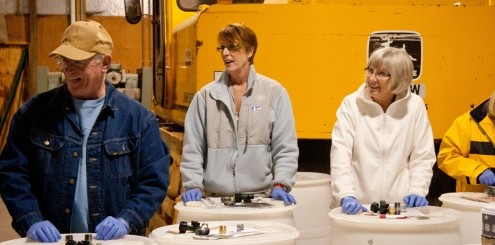How Congress Can Put A Price on Carbon Emissions
Coronado, CA – Citizens’ Climate Lobby’s ‘Carbon Fee and Dividend’ (CFD) plan is gaining ground as a way to reduce CO2 emissions. With less than a week to go before the final vote count, the proposal is among the top contenders in a MIT Climate CoLab competition on carbon pricing strategies.
The Citizens’ Climate Lobby CFD proposal is to place a initial fee of $15/ton on the CO2 content of fossil fuels imposed upstream at their point of extraction and collected upon entry into the economy. The fee would increase by $10 per ton per year after that. All revenues, less administrative costs, are rebated to U.S. households.
The Citizens’ Climate Lobby is a 7-year old, nonprofit, grassroots volunteer organization focused exclusively on passing a revenue-neutral carbon fee and dividend (CFD) to address climate change. CCL organizes at a grass-roots level to build consensus and provides training to help citizens approach their legislators on climate change to gain support for the CFD proposal.
The goal of the MIT’s Climate CoLab is to harness the collective intelligence of thousands of people from all around the world to address global climate change. It utilizes a crowdsourcing platform where citizens work with experts and each other to create, analyze, and select detailed proposals for what to do about climate change.
The Climate CoLab U.S. Carbon Price Competition asks the question, “How could a national price on carbon be implemented in the United States?” The Judge’s Choice and Popular Choice winners will be connected with and able to present to people who can support the implementation of their proposal, which may include policy makers, economists, business executives, NGO and foundation officials, scientists, and others. And the winnders will be invited to showcase their proposals at a conference held at MIT fall 2014, where a $10,000 Grand Prize will be awarded.
After becoming alarmed about the changing climate, Citizen’s Climate Lobby Founder, Marshall Saunders began talking with people at service clubs, high schools, universities, and “whoever else would listen.”
[dropshadowbox align=”none” effect=”lifted-both” width=”468px” height=”” background_color=”#ffffff” border_width=”1″ border_color=”#dddddd” ]”I realized that anything my listeners intended to do as individuals was totally swamped by public policy, by what the government did or didn’t do. While I suggested ways for people to reduce their use of carbon, congress extended a law that gave $18 billion in subsidies to oil and coal companies.”
~ Marshall Saunders[/dropshadowbox]
Saunders founded the Citizen’s Climate Lobby as a way to empower individuals to have breakthroughs in exercising their personal and political power and by gaining the tools to be effective with government.
See Related Article: Recent Poll on Carbon Tax Suggests Shift Toward Public Acceptance.
The Citizen’s Climate Lobby says that their proposal is one that can achieve bipartisan support. And it has the support of leading climatology scientist James Hansen.
Simply put, the proposal works like this:
See Related Article: Climate Change Speaker Advocates Market Based Carbon Tax
According to Citizens’ Climate Lobby Executive Director Mark Reynolds the proposal, called “The Little Engine that Could”, had far more supporters than any of the other proposals in the previous rounds of the competition.
[color-box]
Vote for the Citizen’s Climate Lobby Cap and Fee Dividend proposal proposal at MIT’s Climate CoLabweb site.
Additional action links can be found at our TakeGreenAction! page[/color-box]




